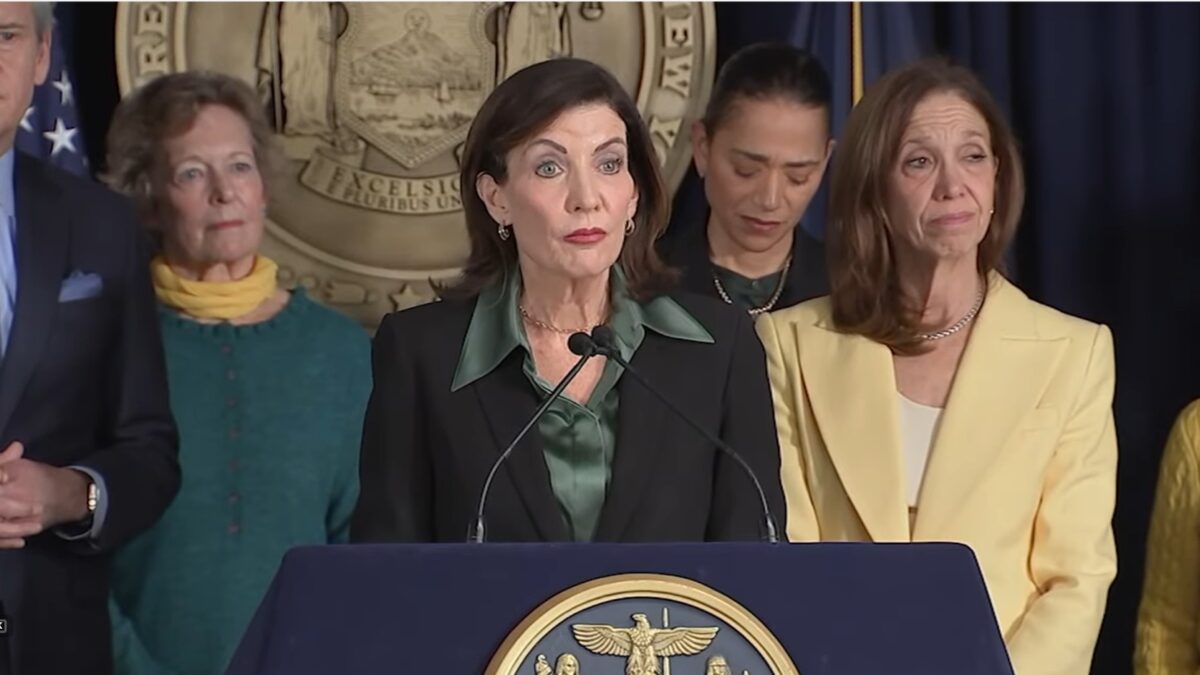
During the last five years or so, the war on drugs has gone from an issue only spoken about by fringe libertarians and on wild frontiers of the Left and Right to one that nearly every mainstream politician agrees needs a serious change. This is progress for any advocates for small government and the dignity of the individual. President Obama, for his myriad faults, has at least yielded to the times and begun streamlining the process of getting some worthy drug offenders out of prison.
Unfortunately, while the war on one vice dials back, law enforcement and government fight hard against another supposed danger. It could be—and sometimes is—another moral failing like gambling. But these days it sure seems as if the hot new thing to swoon over and vow to “do something” about is prostitution. Worse than that, it’s prostitution-slash-sex trafficking, vaguely hand-waved together as the same thing, when they are polar opposites.
There is, however, a recent legal change regarding prostitution versus sex trafficking, according to a Pew Charitable Trust piece from late last month. If you can make a good case that you were forced into prostitution, states are less interested in prosecuting you as a criminal. Every state except for Hawaii has a trafficking-specific law now. According to Pew, who got its data from an anti-trafficking organization, “Since August 2014, 236 trafficking bills were enacted in 42 states and Washington, D.C.”
In some respects, this appears to be progress. People forced to commit crimes should not be treated in the same fashion as people who happily broke the law. People who force others into sexual bondage should be prosecuted (whether clients should be should probably depend on whether the client was aware of the sex worker’s coercion, or being a minor). Some of these laws might be okay (though likely redundant). In a larger sense, however, this is a complete side-step in terms of solving the “issue” of prostitution and sex trafficking as one.
Paternalism Is Out
The solution to the latter is to legalize the former. It’s that easy. Or it could be, if people would do two things: stop filing trafficking with prostitution, and stop pretending that laws against selling and purchasing sex actually prevent people from selling and purchasing sex.
According to one study, there are one million prostitutes in the United States. The vast majority operate outside the bounds of legality, yet they keep working. It’s time to accept that they are a part of American society, and stop preventing the ones who might be exploited by a pimp, or be sexually assaulted by a client, from getting help.
It’s also time to stop forcing help in a paternalistic, top-down manner through “specialized” legal side-streets such as New York state’s Human Trafficking Intervention Courts, which assume all women arrested were victims who would never have chosen this wicked life (a very Progressive-Era notion). Prostitution Diversion Programs have spread over the United States, but they are not without controversy. They, like drug courts, still pack a nasty legal punch and can involve “treatment” that looks a lot like arrest.
Both hand-wringing liberals and worried social conservatives need to realize that some sex workers—perhaps the vast majority—have no need of rescue. They need their line of work to be taken out of the black-market shadows. They need to be left alone unless they ask a church, law enforcement, or any other institution for aid.
Don’t Conflate Prostitution and Trafficking
We tend to look back with shame and bafflement at the obviously absurd moral panics that have gripped our society, but only after the damage has been done. We are in the middle of a sex trafficking panic that not only exaggerates the threat that prostitutes pose to the moral fiber of society but, worse still, makes enormous exaggerations about the number of sex-trafficked (mostly) women and children.
Back in July, The Washington Post gave “four Pinocchios” to a Defiance College claim (based on a misreading of the Center for Missing and Exploited Children’s own misleading data) that each year hundreds of thousands of minors out of the 800,000 to 1.3 million kids reported missing end up at risk for “sexual exploitation.” Considering that more than 99 percent of those children and adolescents are found, these enormous numbers are deeply misleading in general, and especially when trying to figure out exactly who has been forced into the sex trade.
Another detail the WaPo article mentions is that it isn’t just numbers that are wrong in these reports. Definitions of sexual exploitation are also dubious. Nobody wants to see a teenager or child solicited for sex (although there is no source for the claim that this will happen to two-thirds of them within 72 hours), but solicitation itself is not another name for sex slavery.
Nobody wants to see a teen in a desperate situation trading sex for lodging or food. Yet in a country in which kids are not taught useful skills and are generally barred from working anywhere legal until age 16, is it any wonder a teenager with few options might turn to a trade that lacks bureaucracy?
As WaPo notes, even if you can legally have sex, if you are under 18 and use sex as any kind of economic exchange, you are by definition being trafficked. This is misleading, and it is misleading for a very particular purpose—to make this problem look more widespread than it actually is. Big problems, particularly ones that involve imperiled children, can only demand big government solutions.
With anti-trafficking advocacy, you have statistics passed around like folk tales, such as that “tens of thousands” of sex-trafficked individuals in the United States “is a conservative estimate,” according to a 2012 paper funded in part by the Department of Justice. An outraged Politico piece said the number of trafficked children and adolescents was “staggering,” then mentions a score in a few major cities each year, totaling 168 in 2014. If those young people were indeed forced into the sex trade, or were engaging in it at a very young age, that is horrifying and unacceptable. It is also a blessedly small number.
Another small number can be found in the Department of Justice’s Human Trafficking Prosecution Unit’s website, which says that between 2009 and 2011 the DOJ “brought an average of 24 forced labor cases annually.” Between 2008 and 2010, the FBI investigated 2,500 reported sex-trafficking cases, leading to the arrest of 144 people.
Outlawing Prostitution Benefits Do-Gooders, Not Women
Liberalism at its heart is a kind of pessimistic utopianism. It believes that all humans need to keep them good and moral is the right form of bureaucracy. Drugs, selling intimacies for money (or purchasing them, or walking the streets, or anything else intended to outlaw paid sex without actually outlawing paid sex) are bad things that will go away if we pass a law.
Looking at the prostitute as just an immoral woman is out. Giving her aid and the means to start a new life is in. The progressives were all about paternalistically saving poor, fooled women. The progressives of 110 years later operate much the same way.
Again, the (mostly) women don’t seem to have a say in the matter. Whether you happily enter sex work and enjoy the money you earn, or you are an enslaved 12-year-old being preyed upon in the most outrageous manner, or, in the most likely scenario, you complain about your job some days but enjoy the money or the hours of freedom it brings, you must be helped. You are, in short, the same level of victim in either case.
What exactly is being improved when vices are criminalized? With drugs, it is violent criminals, and cops and prosecutors who earn perks based on dangerous civil asset forfeiture laws. With prostitution, it can be similar (including even the asset forfeiture!). A black market is a black market. But it is also advocacy organizations that need to make sure this is a huge problem. So do politicians, who have a rare chance for back-patting, feel-good legislation about redundant anti-trafficking bills.
Over at Reason magazine (where I used to work), Elizabeth Nolan Brown argues unequivocally what I have suspected for some time: “The War on Sex Trafficking is the New War on Drugs.” Brown has written a fabulous, sane, and sensible article that confirms the fact that nobody knows how many people are trafficked each year, but wild numbers run free across the press and into the mouths of politicians, losing what sources they once had, even if those were also wrong.
Intention being the be-all, end-all of justifications for government policies is a liberal mentality. Unfortunately, conservatives also believe it. They just tend to add a religious or fabric-of-society argument. All of the arguments against legalized prostitution are bad. The only question that anyone should be asking is, who is prohibition helping? Why all the myths? What are the chances that, after thousands of years, paid sex will be permanently removed from society—any society?
People Should Be Free to Make Their Own Choices
When Amnesty International proposed that sex work be decriminalized in this summer, there was some backlash. Signers of a protest letter included Hollywood types such as Anne Hathaway, Meryl Streep, and Kevin Kline. They wanted women they saw as victims protected, but their clients prosecuted. In short, the sex workers are the victims, the buyers are the exploiters.
The letter dripped with second wave-style feminism, the feminism of Marxist false consciousness which says that no woman would ever sell her body, that nothing about that exchange could ever be called “voluntary.” This attitude—also seen in a Guardian editorial—is deeply, fundamentally anti market. You could even call it “anti-choice.”
The letter is full of stats. It says “leading trauma experts” want to repeal the 2002 German law that decriminalized the prostitution industry. It does not say whether sex workers themselves agreed. They sure didn’t seem to.
Decriminalizing selling sex and criminalizing buying it is the perfect gentle and paternalistic liberal law. It is in fact known as “the Swedish model,” and widely supported by reformers of a certain type. However, a simple grasp of economics should make you realize what artificially decreasing the supply of clients does to prostitutes.
Reformers hope these women will magically leave this degrading industry and take all the help they can get from noble care organizations. How about when the authorities crack down on buyers of sex, but the sex worker still doesn’t have a new, magically high-paying job? (You know, because the world doesn’t work that way.) How about when the prostitutes continue to work in a job they might actually like, but with fewer clients from which to choose?
If you stage a few high-profile busts and make some noise about cracking down on the sex trade, clients will be discouraged. Remaining will be the determined, or perhaps individuals who are less “normal” and more deviant, because they are still willing to accept the now-increased risk. Instead of sex workers getting to choose clients at their pleasure, the supply is lower, the options much more limited, the risks greater.
Women Have No Recourse If They’re Abused
With all this talk about women’s autonomy, the signers of the Hollywood letter are asking for fewer options for them. In the case of Tara Burns, a sex worker turned writer and activist, a decreased supply in clients lead to a rape. In an August Ravishly article, Burns describes how a series of federal raids six years ago scared away and arrested her clients out near Anchorage, Alaska.
In grim financial straits, Burns accepted a man who seemed questionable. He raped her, and since she was a sex worker, Burns felt she had no legal recourse. In that situation, someone who has been hurt cannot get help from authorities without admitting they are part of a black-market business. It’s the same harm-reduction principle that applies to legalizing drugs so addicts or individuals with an overdosing friend are not afraid to get help. It is accepting that these people exist, and that we’d rather see them safe and doing something of which we might disapprove than see them in danger.
Outlawing heroin, underage drinking, or prostitution is a signal that is intended to say, “We do not condone this as a society.” It’s hundreds of years past the time we accept that human beings do what they will. That includes making bad choices that may cause themselves harm. But if we really believe in small government, we must believe in the choice to do drugs or to use sex as an economic exchange—if only because we know it will happen with or without our permission.









